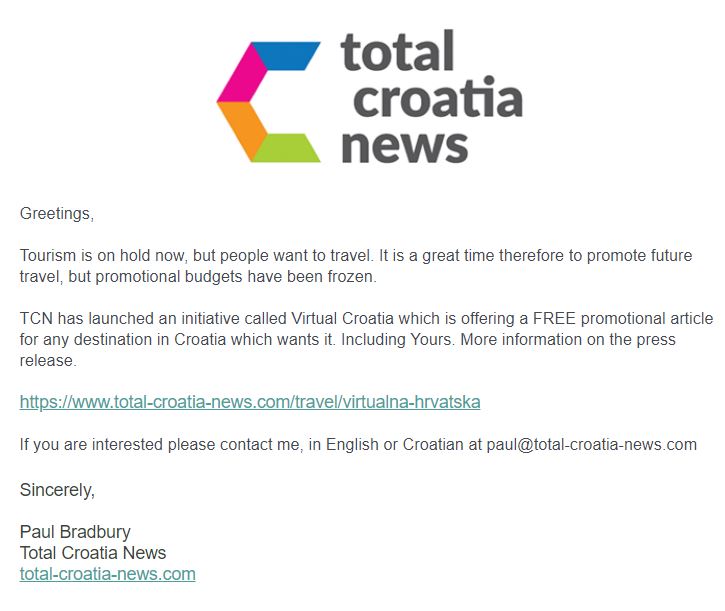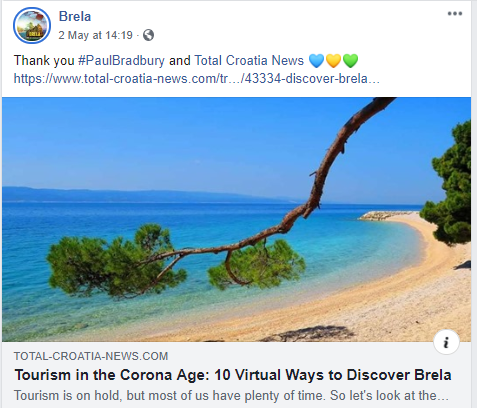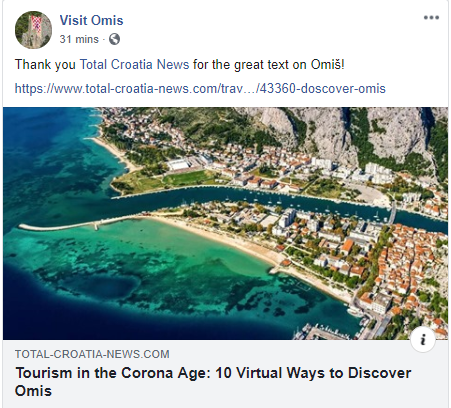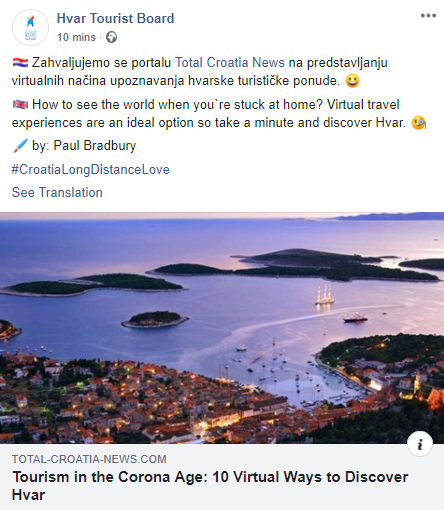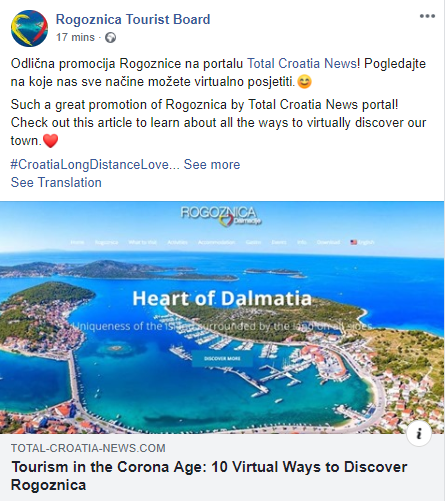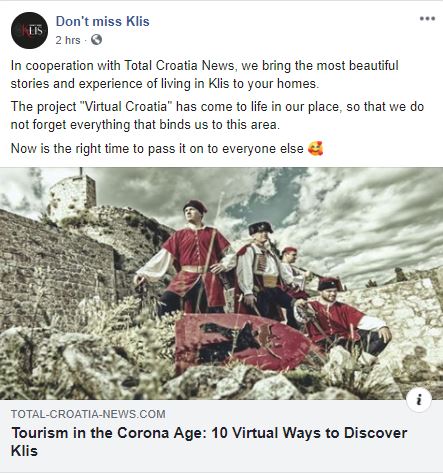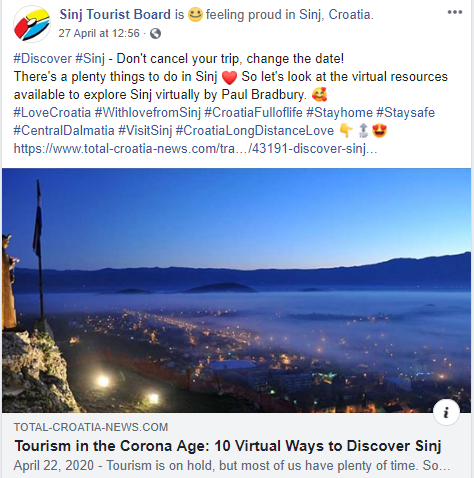Croatian Institute of Public Health Publishes Recommendations for Cultural Programs, Events
May 16, 2020 - The Croatian Institute of Public Health has published recommendations for the prevention of COVID-19 in Croatia during professional art performances, cultural programs, and events.
HRTurizam reports the recommendations for the organization of artistic performances, cultural programs and outdoor events.
General recommendations: At the entrance to the premises, visitors, contractors and staff should be provided with a disinfectant or hand sanitizer and a clearly displayed notice of the obligation to disinfect hands. Also, it is necessary to place a notice in a visible place on the obligation to adhere to general hygiene measures and physical distancing measures.
For the entire duration of the stay on the premises, including arrival and departure, it is recommended to maintain a physical distance between persons (audience, performers and staff) of 1.5 meters. A distance of 2 meters is recommended between, and from, performers of singing sections and musicians with wind instruments. A distance of 4 meters between the audience and the performers on stage is recommended.
It is recommended to mark in advance all seating and standing places at least 1.5 meters apart, and to limit the entrance to a maximum of as many visitors as there are marked places. It is recommended to provide only seating indoors.
When coughing and sneezing, the mouth and nose are covered with an elbow or a tissue, which should then be discarded in the waste bin with a lid and the hands should be disinfected. When coughing and sneezing, the face should be turned away from other people.
The maximum number of visitors who can stay indoors and outdoors at the same time, concerning the recommended physical distance of 1.5 meters among visitors, will be determined by the organizer according to the size of the space and the type of event. In case of need for additional explanations or organization of events with a larger number of participants, they will request approval from the Ministry of Culture, which will consult the Croatian Institute of Public Health if necessary. All events, as well as the planned number of participants, will depend on the current epidemiological situation.
It is recommended that visitors enter one by one in such a way that the first one who enters takes the farthest place in the auditorium, looking from the entrance, and so on. A distance between visitors of at least 1.5 meters when entering, moving and exiting is recommended. It is recommended that the exit of visitors is organized so that they go out one by one, in such a way that the first exit of the visitor closest to the exit.
Visitors should be reminded to keep their distance even after completing the program, not to stay in groups and not to make close contact with each other. It is recommended to regulate the performance of the performers respecting the measures of physical distance, preferably separately, one by one, while avoiding encounters with the audience.
With regard to performances, it is recommended that performances be held only in accordance with the records and with the specified contractors and staff. It is recommended to avoid physical contact, and for performances where it is not possible to maintain physical distance, it is recommended that the same persons always perform. Online ticket sales are encouraged, with which visitors will enter the space directly. After the performance, the used props and other equipment must be disinfected. After the performance, it is recommended that the performers change and shower as soon as possible, respecting the measures of physical distance. Whenever possible, showering is done at home.
It is recommended to ventilate the room at least twice a day for a minimum of half an hour before and after the program or, if possible, leave the window open. Frequently touched surfaces used by a large number of people must be disinfected before and at the end of each performance and program, and at least twice a day. When planning the schedule, it is necessary to provide enough time for the entry and exit of visitors and contractors, and in the case of two consecutive events to allow sufficient time for the disinfection of the space.
Depending on the development of the epidemiological situation, changes to the maximum recommended number of visitors are possible no earlier than June 15, 2020.
You can read all of their recommendations HERE.
To read more about lifestyle in Croatia, follow TCN's dedicated page.
Big Brother in Split: City Center to be Under Video Surveillance this Summer
May 16, 2020 - By the beginning of summer, surveillance cameras will be installed in 14 locations, or public areas, in the city center of Split.
If you've been wondering about the installations in attractive locations around the heart of the city over the last few days, it is most likely the new surveillance devices installed by the employees of the company "Electronic Security", which is the contractor of the project. This news was confirmed to Slobodna Dalmacija by Krešimir Budiša, the mayor's advisor for development projects.
The video cameras will thus cover the most popular areas in the city center, like Peristyle, Pjaca, Matejuška, the area in front of the Croatian National Theater, Sv. Frane, the Riva on both ends, Marmontova, King Tomislav Street near the Josip Hatze Music School, the top of Bosanska Street, Zlatna Vrata, Đardin and Dr. Franjo Tuđman Square.
"With this, we will finally get video surveillance of the city center in the 21st century. The cameras are currently in function at the Croatian National Theater and Matejuška. The cameras will help us fight crime and solve communal problems. For now, the recordings are being monitored from a special room in Banovina, which is being done by a security company, and our plan is to form a joint operational control center for everyone in the building of the former "Čistoća" building," Budiša announced.
HRK 1.7 million has been allocated from this year's budget for the video surveillance of public areas, and the next planned activity is the installation of cameras at bus stops. The Mayor's advisor also announced that the intention of the City of Split is to have full management of traffic and intersections with a modern system, which is already being agreed with the Ministry of Transport.
To read more about lifestyle in Croatia, follow TCN's dedicated page.
Is Eurowings Returning to Croatia this Summer?
May 16, 2020 - Eurowings is among the first to announce the return of flights after a long hiatus caused by the COVID-19 pandemic. And as Croatian Aviation (CA) reveals, the airline has decided to launch certain international routes to destinations in Croatia.
Namely, as Croatian Aviation exclusively finds out, Eurowings has decided to launch certain international lines to destinations in Croatia.
You can see the schedule provided by Croatian Aviation below:
The Cologne - Zagreb line operates twice a week, and in the following period, it will be reduced to once a week.
The Cologne - Zadar line is introduced once a week, on Saturdays, from 20 June.
The Stuttgart - Split line is introduced, once a week, on Saturdays, from 6 June.
The Hamburg - Rijeka line is introduced, once a week, on Sundays, from 21 June.
The Hamburg - Split line is introduced, twice a week, on Tuesdays and Sundays, from 2 June.
The Düsseldorf - Split line is introduced, once a week, on Saturdays, from 20 June.
The Düsseldorf - Rijeka line is introduced once a week, on Saturdays, from 20 June.
The Düsseldorf - Pula line is introduced once a week, on Saturdays, from 20 June.
Eurowings will monitor the situation with the epidemiological situation and border regulations of individual countries and respond in a timely manner by introducing lines. Croatia is one of the most important destinations of this low-budget airline and there is no doubt that in the coming months, Eurowings will return to Croatian airports on an even larger scale, writes Croatian Aviation.
Recall, this news comes after British Airways announced it would fly to Zagreb and Split next month in a significantly reduced flight schedule compared to their operations before the outbreak of COVID-19.
Namely, from June 1, British Airways will fly between London (Heathrow) and Zagreb three times a week (Mondays, Fridays, and Sundays) on the A320 aircraft.
The route between London (Heathrow) and Split will operate from the same date. The line will run four times a week in June (Mondays, Thursdays, Fridays, and Sundays).
Seasonal routes to Dubrovnik and Pula on British Airways are not on sale for now. It is expected that the number of weekly flights to Zagreb and Split will increase in July, and then the lines from London to Pula and Dubrovnik could start operating in a reduced form.
To read more about travel in Croatia, follow TCN's dedicated page.
Zadar's Bacteriological Institute: Croatian Public Health As It Once Was
May 15, 2020 — Croatia has grown well-acquainted with its medical professionals and public health institutes. But what about their ancestors?
The National Archives in Zadar created a virtual exhibit of the town’s former Bacteriological Institute, a predecessor to the modern epidemiologists and public health apparatus. The slideshow and text is part of the joins the seventh festival of history - Kliofest.
Taken together, it chronicles the institute's creation then nearly instant battles with a cholera outbreak. Many of its practices — of informing the public, communicating strategies — exist today.
Archivist Edi Modrinić organized the exhibition, bringing photographs and newspaper articles from the institute’s founding in the late 19th century to the end of World War II.
The photos show sparse labs and researchers working in a sterile white environment.
The Bacteriological Institute was located within a military hospital, in the former monastery St. Nikola. It’s now the International Center for Underwater Archeology in Zadar.
The 19th century bred many scientific discoveries, especially in the fields of physiology, pathology, and microbiology. The changes eventually bred a sea change in health care. A chemical-bacteriological laboratory was founded in Zadar at the end of the 19th century to exploit these advances. It was led by a young doctor, Alfons Boara. It dissolved quickly, but local medical professionals saw a need for such a facility.
Dr. Božo Peričić in 1905, encouraged by a local cholera outbreak, publish a translation of a scholarly article about the need for public medical facilities and institutes in local paper Narodni List. Peričić — well known in local circles — "considered it worthwhile to translate it, because even in our circumstances, reading will be useful to everyone, and it may encourage our leaders to think and act more vividly in regard to some of the issues raised here.”
Looking out for the public good (and perhaps some more stable employment), Peričić asked the institute be revived to protect against typhus, diphtheria, tuberculosis, and cholera. The diseases hit Zadar in waves throughout the 18th and 19th centuries, along with the plague, making the Adriatic hub one of the world’s foremost authorities on mass quarantine.
“About ten years ago, such a laboratory was established on the Dalmatian governorate,” Peričić wrote. “Sure it was a start but definitely a good start. Envy and negligence quickly found themselves at work to destroy everything. The view of epidemics (dangers to which Dalmatia as a country by the sea is more exposed than others) and the view of the antimalarial struggle, the lack of a well-organized laboratory is a shame and damage from which other provinces do not suffer.”
The Bacteriological Institute’s second iteration opened in 1912, the first institution of its kind in Dalmatia.
They aimed to improve scientific efforts and control in the fight against epidemics and infections, and at the same time to educate future doctors.
The institute was equipped with modern devices, materials, and resources, which can be seen in the photos. Among other things, it had ten study rooms that housed a hygiene department, a bacteriology department, an animal research room. In it, various diseases could be diagnosed by biochemical and microbiological methods, such as malaria.
The institute turned into a hub of medical and serological innovation, including the first case of brucellosis or undulant fever.
The Dalmatian Governorate invested substantial sums of Vienna’s money into the institute to fund its research.
After the First World War, the Institute continued to operate as the Laboratory of Hygiene and Bacteriology (Laboratorio di vigilanza igienica e batteriologica). About 600 bacteriological, chemical and bromatological tests were performed that year.
The laboratory was led by bacteriologist Dr. Giovanni Venturelli, who led a lavish and well-equipped institute — in danger of closing due to lack of work. In 1923, the Ministry decided to close the laboratory only to be reopened again in 1934.
During the Allied bombing in World War II, the laboratory building was severely damaged, yet some laboratory equipment was preserved. A new chemical-bacteriological laboratory was opened on October 6, 1944 — the fourth version — in a small villa housing the naval command ambulance was located at the time. It remained underutilized until Zadar’s hospital opened. This final iteration of the laboratory is considered a parent to the Croatian Institute of Public Health — currently leading the charge against the coronavirus by Krunoslav Capak.
Details of Croatia's Coronavirus-Tracking App Emerge
May 15, 2020 — Croatia’s coronavirus contact tracing app will avoid harvesting personal data and instead model itself on its Singaporean and South Korean predecessors, according to Saša Bilić, president of the company tasked with creating it.
The APIS IT head said in an interview with N1 the application spent weeks in development. It will be released in a few weeks.
The app will use Bluetooth technology, not geolocation, to monitor people’s contacts. It will be completely voluntary.
The company said it followed recommendations from other EU countries and kept privacy foremost in mind when building the app.
“If a person gets sick, they will voluntarily let everyone they have been in contact with over the last 14 days and contact an epidemiologist," Bilić said.
Applications will be interoperable across countries, to align with the tourist season.
“The application will record contact if people are closer than two meters and in contact for more than 20 minutes,” he said. “When someone gets sick, if that person allows, his contacts are sent an anonymized message that they were in contact,” explained Bilić, adding the patient’s name is not revealed.
The app is based on the positive experiences of Singapore and South Korea with the aim of technology helping the medical, epidemiological profession trace contacts.
Bilić especially emphasizes that there is no data storage, that all records are only in a particular mobile device, and that using the application would be part of the responsibility of each of us.
The app will work on Google and Apple devices. The companies will release updates to their mobile operating systems allowing the apps to run — but only for official purposes.
Croatia’s app will fall under the auspices of the Ministry of Health, Bilić said, emphasizing that it will not record names of phone numbers.
He also said that they are ready for the elections, organizationally and in terms of personnel and that they should start with all the necessary actions as soon as they receive an order from the elections committee.
Croatian Prime Minister Andrej Plenković first mentioned the government’s app on Wednesday.
“New technologies enable much more [help for the healthcare system] than without them,” he said. “Croatia is working on the application. It will protect the privacy of all our citizens.”
At a press conference of the National Civil Protection Headquarters, Interior Minister Davor Božinović confirmed an earlier statement by Prime Minister Andrej Plenkovic that Croatia has been working on an application for "catching contacts" for several weeks.
What Happens When 319 Croatian Tourist Boards Get a Free Offer in a Pandemic?
May 15, 2020 - With tourism budgets frozen due to corona, how do Croatia's 319 tourist boards respond to free promotional help? The Virtual Croatia mailshot results are in.
We live in funny times, and nowhere is that more true than in Croatia.
We are a tourism country with a population of about 4 million people. And (to use Minister Cappelli's interesting corona-era metaphor) "Croatia breathes tourism."
So much so, in fact, that if there is a sign of life, we build a local tourist board and install a director. That works out (and no, we have not included the 20 regional boards or the Temple of Tourism, the National Tourist Board), at 1 tourist board for every 12,500 people in The Beautiful Croatia.
Times are hard in the Kingdom of Accidental Tourism. And elections are coming. So hard in fact, that last week an organiser of a well-known national event told me that the tourist board he is working with for a postponed event asked if he could return the money invested until July because "we need it for the elections, but will return it immediately after."
So the days pass in the Mighty State of Uhljebistan.
Tourism promotional budgets were frozen. Outrageously, at a time when tens of thousands of workers in the private sector were losing their jobs, salaries were reduced by between 4-20% for workers in the 319 local tourist boards. There were no job losses of course - this was the public sector in Croatia - but a salary reduction? And no promo budget to give to the cousins? There were rumblings in the Mighty State of Uhljebistan.
This was a terrible state of affairs. Imagine these poor tourist boards, all 319 of them, with reduced salaries and no budgets to support their cousins' events or (oh yes, the other thing) promote tourism. This coronavirus was devastating.
Before I moved to Croatia, I worked as a humanitarian aid worker in Somalia, Georgia, Rwanda and the edge of Siberia. That humanitarian streak has never left me. I didn't have the cash to feed all the cousins in these difficult times, but I could help out with (oh yes, the other thing) promoting tourism. I did a press release, which got a lot of traction in the Croatian media, offering a free article for any tourist board in Croatia which wanted to join our platform, Virtual Croatia. Just send me the tools, and I will do the rest.
The Croatian National Tourist Board very kindly supplied me with the latest database of local tourist board, so that I knew that my free offer would reach the right addresses.
I sent the offer above, knowing that these were difficult times and that I had no money to bribe them to accept my free offer.
So what were the results? How many of these very busy local tourist boards - with no budget to feed their cousins and no tourists to disturb their day - engaged with this free offer with no benefits to them personally?
I sent the offer on April 30. Two weeks later, an impressive 26% of the 319 tourist board have found the time and interest to open the email.
An impressive 26% found time in between their other duties in a pandemic with no tourists and no promotional activities to open the email. Quite understandably, with such outrageous salary reductions, why open the email at all, asked 74%?
The pure cheek of it! What right did this fat Irishman have to send me an email regarding work when I am having a 4-20% salary reduction. Although I only had 2047 tourists last year (an impressive 6 tourists a day), not only do we not need any free help, we will unsubscribe.
The thing I have found, especially in Central Dalmatia, is that there is a new generation of local tourist board. Young directors who get the need to engage with tourists and not cousins. I have about 18 tourist boards who have taken me up on the offer, or about 301 who haven't, depending on how you look at it.
Dream Today, Visit Opatija tomorrow.
With about another 10 to come.
My apologies to the 225 tourist boards who did not open the email. Apologies with a chocolate biscuit to those I inconvenienced and who rightly unsubscribed. May your budgets return soon, your salaries be restored - no, increased - and who gives a f*ck about the tourists?
If you are a local tourist board who would like to take part in our Virtual Croatia project, here are the details.
Public Coastal Liner Transport to be Restored on May 18
ZAGREB, May 15, 2020 - The national civil protection authority has decided to lift restrictions as of May 18 on public coastal liner transport, which will enable the restoration of the sailing schedule.
Interior Minister Davor Bozinovic said on Friday this decision put out of force decisions on the extraordinary Olib-Silba-Premuda-Zadar line, which was introduced to supply islands, and the extraordinary Zadar-Ancona freight ferry line.
Asked by the press if the government would be responsible in case of layoffs, as warned by the Croatian Employers Association on Thursday, he said this was not in the Interior Ministry's remit and that if the Economy Ministry asked the national civil protection authority about it, "it will get an answer."
Bozinovic said that because of the favourable epidemiological situation in Croatia, the authority would no longer hold press briefings over the weekend.
The next press conference will be on Monday, while over the weekend the authority will issue press releases with the latest information on COVID-19 infections.
Grmoja: HDZ Has Adapted Everything to Suit Its Own Needs
ZAGREB, May 15, 2020 - MP Nikola Grmoja (Bridge) said on Friday that the Croatian Democratic Union (HDZ) had made everything it had done, including the timing of the parliamentary election, to suit its own needs, adding that Bridge had not yet decided whether it would run in the election with Miroslav Skoro's Homeland Movement.
"They have adapted the election and everything else they have done to suit themselves. Croatian citizens are not important here... nor what the opposition thinks. This election is for them. I call on citizens to respond to this attack by going to the polls and to listen to those who will call on them to go to the polls yet until yesterday were telling them to stay home. Listen to them this time but don't vote for them," said Grmoja.
He rejected the interpretation that previously he had called for a snap election and was now objecting to the election being held in July.
In response to reporters' remark that according to news coming from the Homeland Movement, election slates were a bone of contention, Grmoja said that "slates and candidates' ranking on them are not the problem," and that he could be in the last, 14th place personally, but that the issue at hand was what sort of people would enter parliament through that alliance.
"I do not want obedient people to enter the parliament and secure Plenkovic another term in government," he said.
He admitted that Bridge had not been the best in selecting personnel and that it had made some mistakes but nevertheless he believes that the party did not entirely go wrong with its people.
Restrictions for Travel across Slovenia-Croatia Border Relaxed for EU Citizens
ZAGREB, May 15, 2020 - The Slovenian government's decision to declare the end of the COVID-19 epidemic has surprised many, and the government spokesman said on Friday that the decision was based, among other things, on the improved situation in Europe and dialogue between Slovenian and Croatian epidemiologists.
On Thursday evening, the government led by Prime Minister Janez Jansa also decided that citizens and residents of the European Union and the European Economic Area (EEA) are free to cross into Slovenia provided that they did not stay outside Europe in the last 14 days.
Restrictions for third-country citizens remain in place. Third-country nationals must undergo a mandatory two-week quarantine, with exceptions for diplomats, members of rescue and relief services, attendance of funeral, lorry drivers and persons with certificates issued by the competent Slovenian ministry showing they will provide urgent services.
Asked by the press about new regulations for travel from Croatia to Slovenia, government spokesman Jelko Kacin said that the two countries now had similar epidemiological situations.
The additional reason for the relaxation of restrictions for travel across the Slovenia-Croatia border is to make it easier for students in the contiguous areas in Croatia to continue attending school in nearby Slovenian towns. Slovenia's schools will reopen their doors for pupils on Monday after two months of online learning.
Slovenia is the first European country to declare an end of the coronavirus epidemic.
Zagreb Loves You, Latest from Croatia's Best Destination Promo in Corona Era
May 15, 2020 - Zagreb Loves You, and we love the Zagreb tourism promotion campaign during these difficult times, even without the earthquake. The best campaign in Croatia.
One of the most fascinating things from a tourism point of view in recent months has been to observe how the tourism industry has approached this unique set of circumstances. In an age where people could not physically travel, was there any point in even mentioning tourism at all?
The reaction of official tourism bodies was very diverse. Some tried to ignore the reality that there was a global pandemic going on, promoting tourism as though nothing was happening. Others simply went into hibernation and disappeared off social media. And many others, after a period of confusion, joined the global trend of Dream Now, Travel Later.
And while I saw many alluring photos and enticing videos, there was only one destination that I really craved during my lockdown on Hvar. And it was the destination which truly bared its soul these past few weeks, allowing future visitors to get to know it intimately. And it was the destination which easily had the best campaign to promote itself during these terrible months of any destination in Croatia.
Zagreb.
More than two months ago, and a week before the devastating Zagreb earthquakes, I wrote an article after a chat with the Zagreb Tourist Board. Yes, tourism was technically still possible, but with the situation changing by the hour, perhaps now was the time to put travel on hold and think about tourism in the future. With people spending more time at home and with more time on their hands, why not encourage people to stay safe, travel later AND give them lots of content to explore now while they had the time. Here is the article Tourism in the Corona Era: 10 Virtual Tools to Discover Zagreb.
We certainly weren't the first in the world to come up with the concept of 'dream now, travel later' which has become such a one-dimensional strategy in recent weeks, but the concept of creating the desire AND giving lots of virtual content so that people had time to explore was new. And that Discover Zagreb article was one which inspired the recent TCN Virtual Croatia campaign.
Then the devastating events of March 22 took place, as the earthquakes hit at the height of the pandemic. A terrible time for the people of Zagreb, with corona on the outside, earthquakes on the inside. How to even consider promoting tourism at a time like this?
My heart went out to the people of Zagreb, many of whom are my close friends in a city I have come to love in recent years after a lukewarm start to the relationship 18 years ago. If I had desire to go anywhere in these travel-restricted times, it was to the Croatian capital.
Was that partly due to my wish to show solidarity for the people of Zagreb and my many friends there, or was that love of the city enhanced by the lovely official campaign, the like of which I have not seen elsewhere in Croatia in recent weeks.
For Zagreb did what no other destination did - it bared its soul. Invited people into its most secret corners, allowing people to connect to the destination in a way I did feel anywhere else.
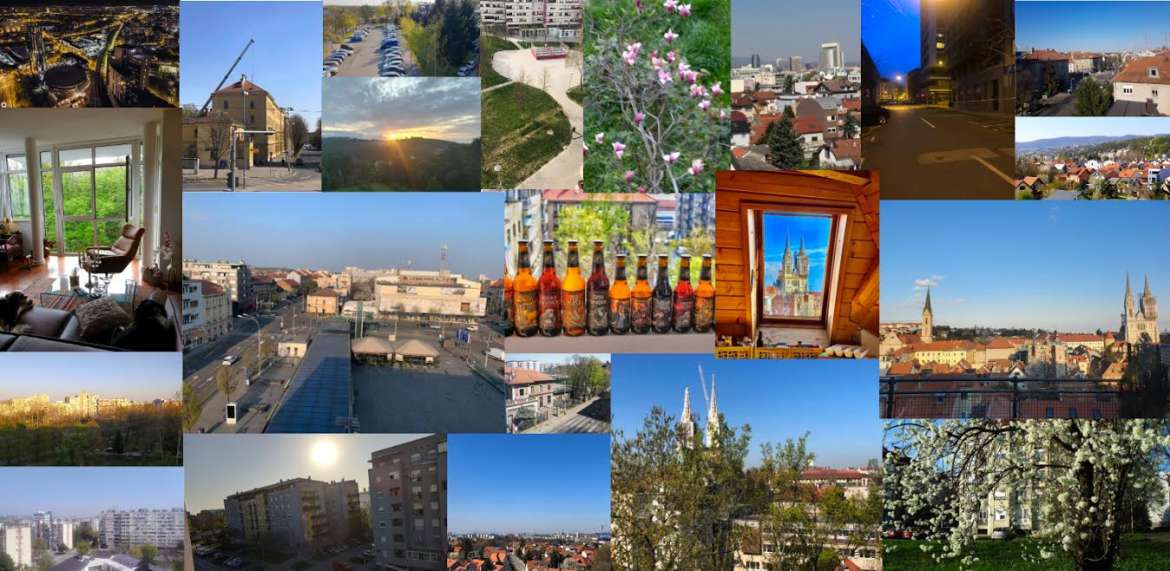
Perhaps it started with the immediate aftermath of the earthquake and the very poignant video posted the same day.
Perhaps it was the emotion of seeing the top of the second cathedral spire removed.
But something happened. And while other destinations shared photos of beaches and sunsets that can be found all over the world, Zagreb sucked people into its every corner, its citizens keen to show every aspect of the city and how they were resiliently dealing with all the tragic events.
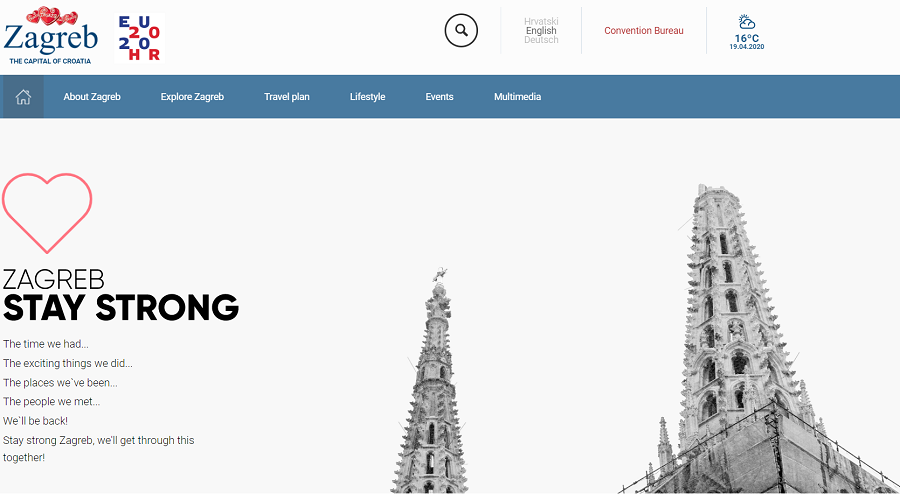
Last month, I wrote about the continuing campaign in Damaged But Resilient: Brilliant Zagreb Tourist Board Virtual Campaign.
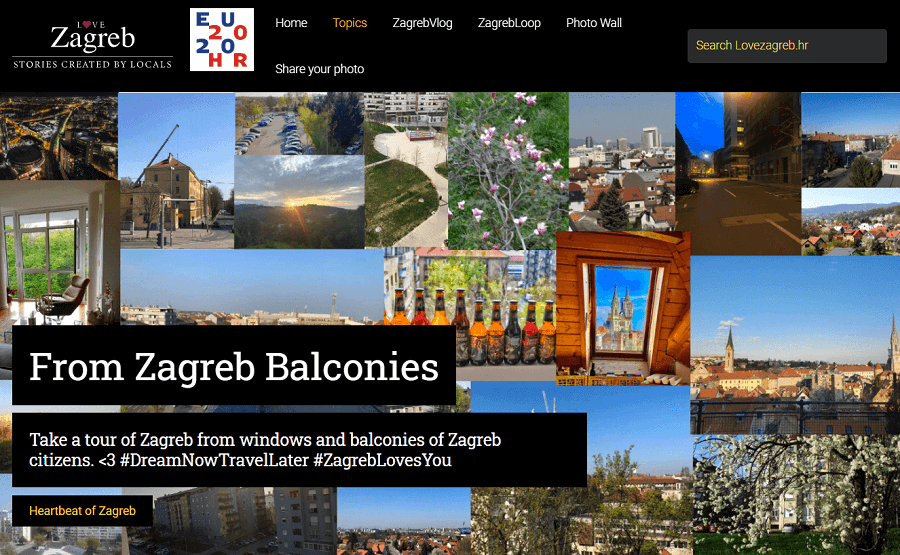
It includes great campaigns such as 'From Zagreb Balconies' where citizens have been sending their balcony views of the Croatian capital - a delightful cross-section of shots of the city, which you can explore here.
The Zagreb Tourist Board has also created a wonderful virtual section on its website called What to Do at Home.

One of the best resources for understanding the complete situation in this beautiful city under attack from corona and earthquakes is the Love Zagreb blog, another Zagreb Tourist Board project online, which brings the heartbeat of the city into your living room. There were some fabulous texts written in recent weeks. If I could pick out a few to check out, they would be:
Zagreb - A City With a Spirit of Steel
In The Times of Hardship, We Stick Together
You Can Still Have Fun While Staying Indoors
Zagreb's Virtual Farmers' Market
I have been coming to Zagreb for years, once a week minimum pre-corona, but now I was learning something new on a weekly basis, new places to explore when all this is over.
This month brought a new month of discovery and emotion.
Zagreb. Be There. Again...
And I will be. Tomorrow. Leaving Hvar for the first time in two months, destination Zagreb. I am excited but strangely nervous about what I will find. I, who have travelled the world, lived in 10 countries and visited 96.
A new month. A new campaign, with the dulcet tones of Emmy Award-winning reader, Rob Reider.
Zagreb Loves You.
This video is made of memories... and soon... we will be making new ones. With YOU!
Can't wait to see you again in Zagreb!
And nor can I. Until tomorrow, then.
The campaign runs until May 19, and there have been more than 300 submissions so far, making it more popular than the Zagreb balconies feature.
And I will be adding my own contribution tomorrow, as well as eagerly awaiting the next phase of the campaign.
Follow the latest on the official Zagreb Tourist Board Facebook page.

